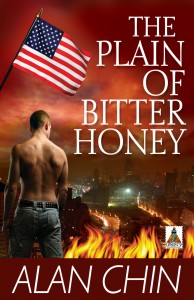|
Reviews
Rating: Five Stars
This is no mere flash-in-the-pan "novel" that one can read
through hurriedly in one sitting. This book should savored
like fine wine, something to appreciate so one can get the
full experience of the subtle layers of flavors that can
further intensify the pleasure.
The Plain Bitter of Honey by Alan Chin is about twins
Aaron and Hayden Swann who are fighting a corrupt
government taken over by ultra right-wing Fundamentalist
Christians in 2055 America. Each brother fights in his own
way, Aaron with bullets, Hayden with words. Then one night
their world is turned upside down when they are caught in
a government sting and they must both flee north into the
badlands between San Francisco and Canada, where the only
safe haven is a place called The Plain of Bitter Honey, a
refuge where heads of the Resistance operate. But the
brothers don’t know that government agents are tracking
them to the hiding place of the Resistance. Can they find
the inner strength to survive?
How does one even attempt to write a review on a book that
is essentially larger than anything I have read of the MM
genre?
For starters, the title confused me because there was an
obvious play of words involved and it was only towards the
end of the book did I realize, belatedly, the why's of
this play. Then there was the genre: MM. Why this is this
genre escaped me again for the longest time, as this did
not fit the general picture I have in mind based on the
hundreds of MM books I had read. Again, it was towards the
end of the book did I realize the whys.
This book took me some time to read not because of the
length of the story. Instead, I found myself putting it
down from time to time whenever I encountered something
that was thought provoking. There were so many
philosophical ideas and ideals thrown when turning the
pages. I started comparing Hayden to Rizal, a national
hero who brought down a government by the mere strength of
his pen and Whitehall to Al Capone.
This is, for me at least, the story of Aaron who is caught
in a dystopic world of a futuristic hypocritical America.
This is really his journey from a plain soldier of the
resistance to maturity. He has an idea, but really knows
nothing, of philosophy or how words can be mightier than a
sword. His actions result to a disastrous turn of events
that lead his and Hayden’s life to danger, along with the
rest of the resistance. His continued struggle with guilt
and how to make up for it spurs him to go on, even if it
meant risking his own life to ensure his brother’s safety.
It was through their journey to The Plain of Bitter Honey
that he finally realizes that sometimes, in order to win a
war, using counter-violence may not be the most obvious
and easiest choice. It is through this learning that Aaron
finally finds his resolution and through this process,
realizes his potential.
The Plain Bitter of Honey was bittersweet and, although I
did not initially like how it ended, I found that it would
not matter that it ended where it did. There was no other
way but to end it that way. It is only after this end and
some time to think things over would the readers
eventually realize wh y I say this.
This is the first time that I have read Alan Chin and I am
very happy that I have finally done so. I now see the
reason why he has won literary awards. His words are
thought provoking, if I may repeat myself. That may sound
cliché, however, no other words come to mind presently.
Do I recommend this book? The 5 Stars rating is an obvious
recommendation.
Warning: The Plain Bitter of Honey is not for readers who
are looking for an HEA or an HFN ending. The heat rating
is zero (0) so do not expect the usual scenes.
-- Multitaskingmomma
Rating: Five Stars
There are some books that are really easy to write reviews
for. And there are others that are difficult. Not because
they're not great books, but BECAUSE they are great books.
This is one of those. I cannot write my typical spazzing
out sort of review for this book because it just wouldn't
do it justice. And this book deserves a lot of careful
thought.
The Plain of Bitter Honey takes place in the not too
distant future. The America that is painted for readers is
very grim. At least for some. For some people, they might
like the fact the Christianity has taken over and the
States have become a Christian nation. However, it is hell
on Earth for many people in the book. If you do not agree
with the views of those in power, or if your life and
loves are different from what they think it should be, you
are placed in ghettos.
I'll flash back to history here, because what the author
has done is draw on the Holocaust. There are many
allusions to what happened in Nazi Germany during World
War II. It is done masterfully, because it shows just how
horrific the world has become.
Aaron and Hayden Swann are identical twins that are part
of the resistance. At least Aaron is. Hayden, it seems, is
off in his own world of literature. As a gay man, he has
to hide the fact that he loves his boyfriend Julian, for
fear of either being placed in the ghetto or being
treated. While Aaron is very hard and driven, Hayden seems
so carefree.
Looks can be deceiving.
What follows is an incredible journey to save the twins,
the reistance, and everything they hold dear. There were
times when I thought for sure all hope was lost, but the
beautiful thing about hope is that it's always within
reach if you just keep believing.
The author also weaves in some beautiful moments of
magical realism as well, such as when Aaron is training
with Twig and he learns to blend into the trees and become
a part of them.
The conclusion of the novel is ultimately heart-breaking
and beautiful. It is full of hope and you want the
characters to succeed. I stayed up past one in the morning
to finish because I couldn't stop, and when I finally came
to the conclusion, I put the book down, curled up in the
fetal position on my bed, and just cried.
Such a wonderful novel from Alan Chin. He has a way with
words that will leave you thinking and praying that this
is not the future that we are headed towards.
Frighteningly enough, with the current state of our
country, it at times feels that way.
I look forward to many more books from this author.
-- Jennifer Lavoie's Reviews
|
Excerpt
At the dawn of the
twenty-first century A.D. the United States of America lay
dying.
Death permeated the
stagnant air: never more visible than when Christian
families painfully pretended to keep alive their faith—as
though by rouging the face of a corpse they could somehow
bring it back to life. The frequent visits to sterile
churches, the heart-felt Amen to sermons on the Christian
channel, the loud chants of brotherly love and family
values and freedom—above all, freedom—had all become
purely decorative, a senile grimace before a cracked
mirror.
A malignant
stench hung in the air, even though the throngs at Dodger
Stadium, Madison Square Garden, and the Super Bowl still
roared with pleasure.
The specters
people witnessed, from the comfort of their cozy living
rooms, in Iraq, the Sudan, and Burma became projections of
their own tortured souls. But the vast majority of
Americans, souls already dead, saw nothing, and had no
premonition of the changes already in play.
The fall of the
World Trade Towers at the beginning of the century brought
a sharp change in the political climate. Politicians still
boasted of the country’s military might, the benefits of
technology, and increased corporate wealth. CNN still
claimed the country was the land of freedom, but outsiders
asserted that the U.S. was dying of iniquity, pride and
vanity. The people were more concerned with Hollywood’s
latest scandal than how many people were being killed in
order to keep the nation’s troughs full. But a predatory
economy can only flourish for so long. Wars bled the
country into feebleness and debt while parasitism ran
rampant, eating into the country's vitals. The blinded
eagle could neither seize new prey nor remove the maggots
feasting in its own flesh.
Countries once
allies turned hostile. The very people who profited most
from the crumbling culture were also the first to escape.
The rich gathered their wealth around them like cloaks and
fled to other countries. The middle class who had once
made America great, now overburdened by their debts from
wars, the astronomical cost of raw materials, the need for
Hummers in every garage and flat-screen TVs in every room,
defaulted to their creditors, causing a collapse of the
world banking system. Desperate people on the fringe
became homeless, forming lawless bands of marauders
roaming the countryside, seizing what they needed to
survive. Inside
the cities alcoholism and drug addiction became the norm
while outside it was every man for himself. Farmlands went
fallow, the cost of food skyrocketed, and the rate of
obesity actually fell for the first time in America’s
history.
Those who could
afford to flee the country did, so in 2035 when Congress
sought to outlaw further exodus, they were talking to
empty air.
Public works were visible
in the colossal municipal buildings, empty shopping malls,
and power plants. Large-scale expenditures for new
Christian cathedrals, sports arenas, military spying
technology, and monuments to the fallen heroes of war were
widespread. These projects were paid for by budget
cutbacks in infrastructure maintenance, which hastened
decay, and the country began to crumble.
In the face of
steady deterioration, the remaining population’s belief in
the opiates of “the American way of life” and “a
benevolent God who loves and protects us” remained
unchanged. They were convinced there would always be a
United States of America, that technology and Christian
ideals would keep them at the pinnacle of human culture.
So they thought until one man came wandering out of the
wilderness, wielding words and ideas rather than guns, to
lead them toward a true salvation.
|

